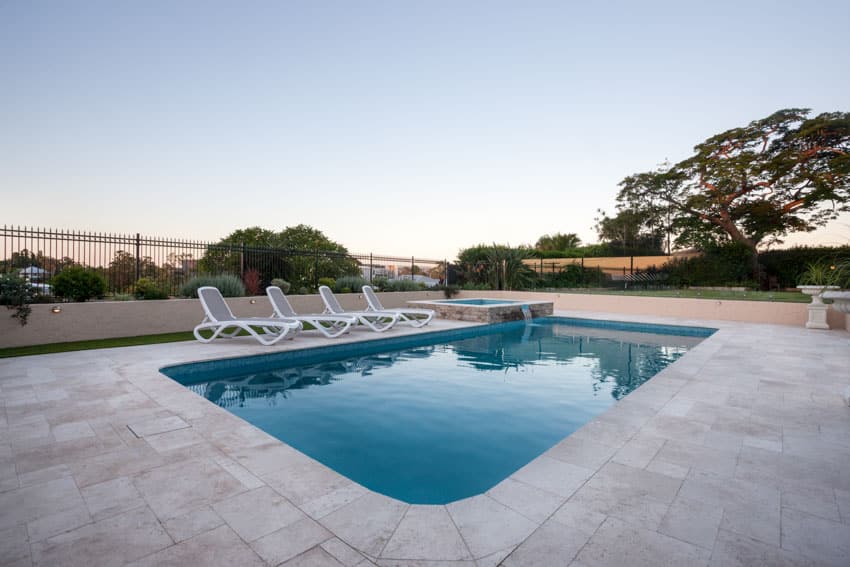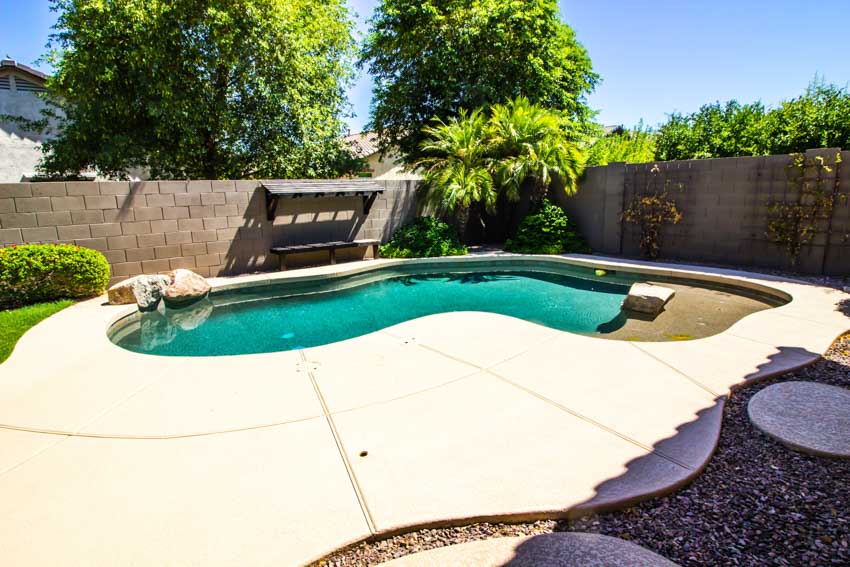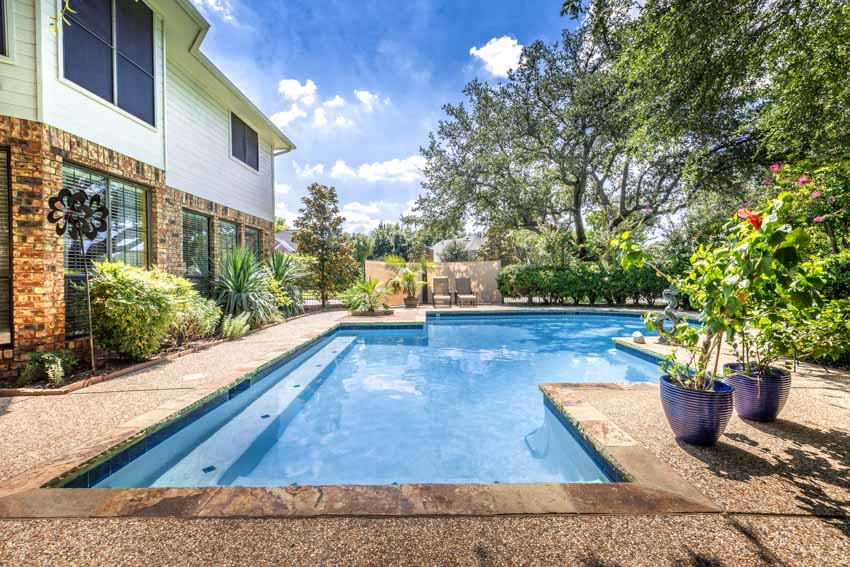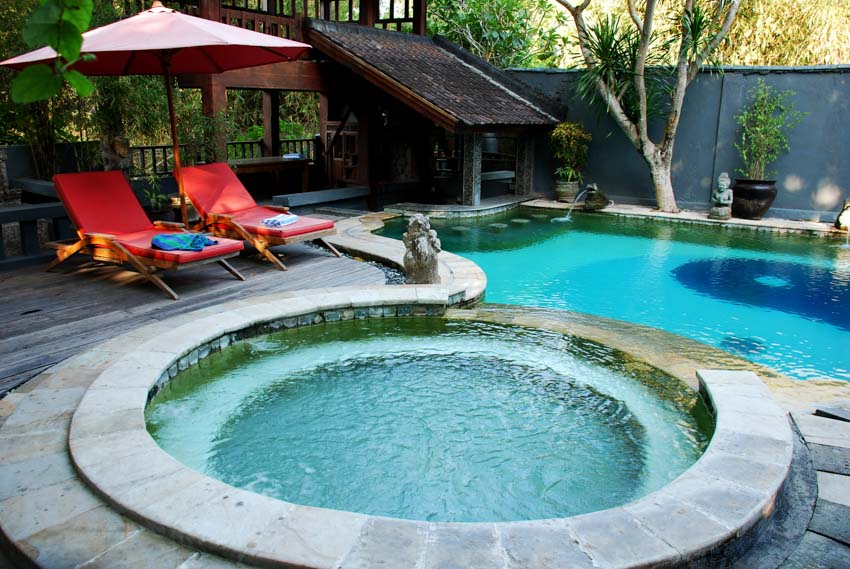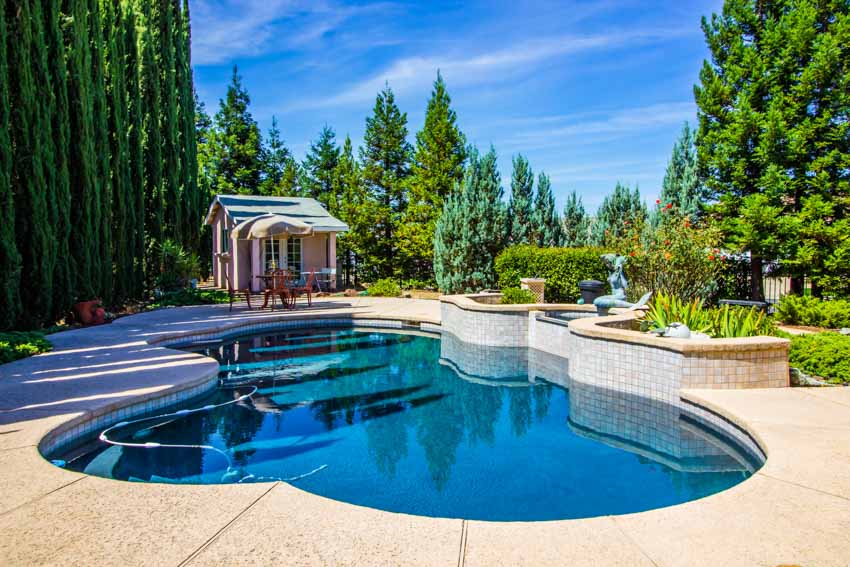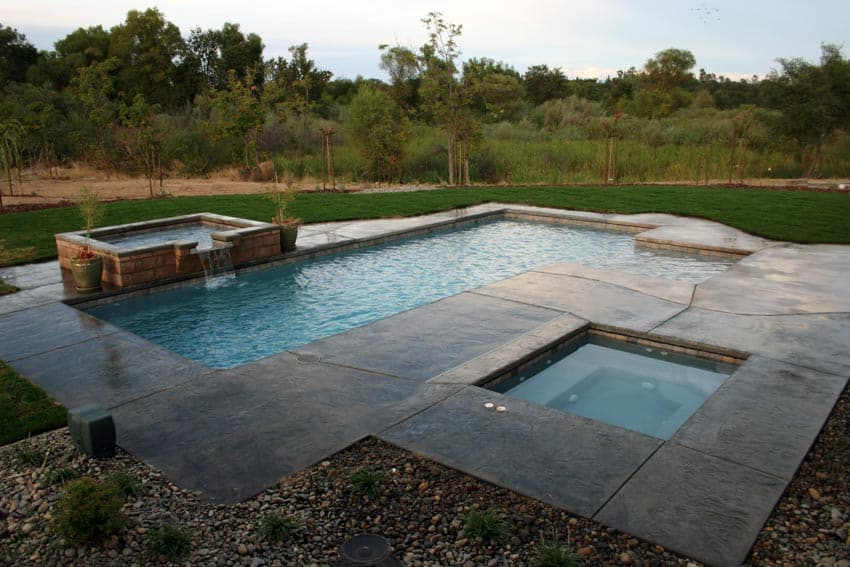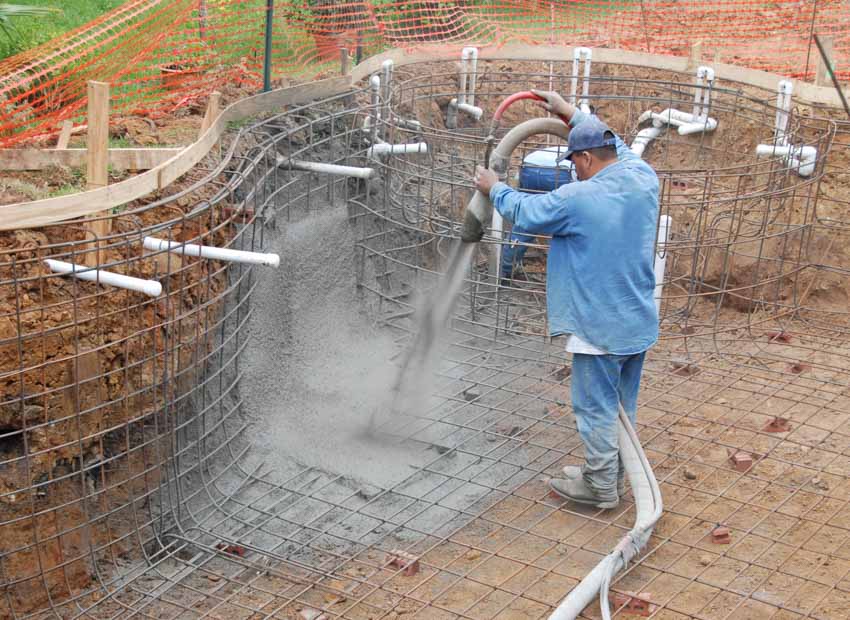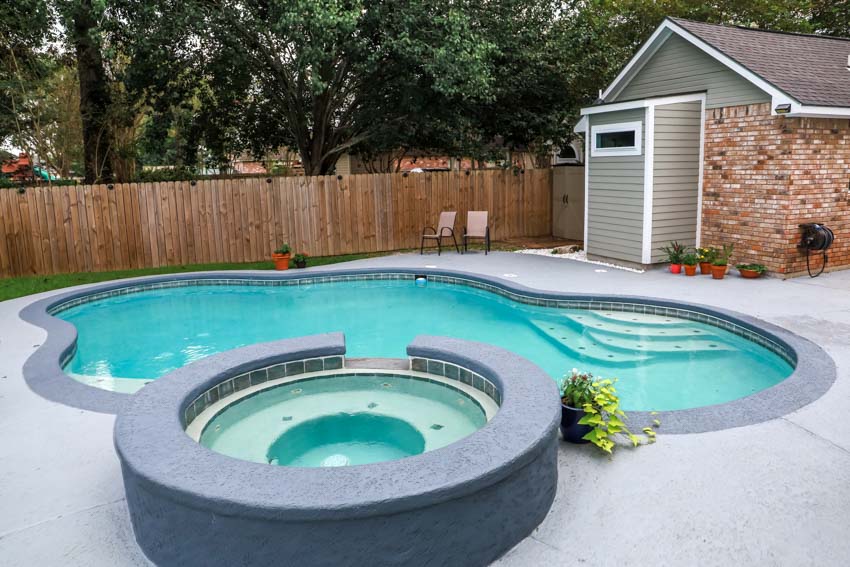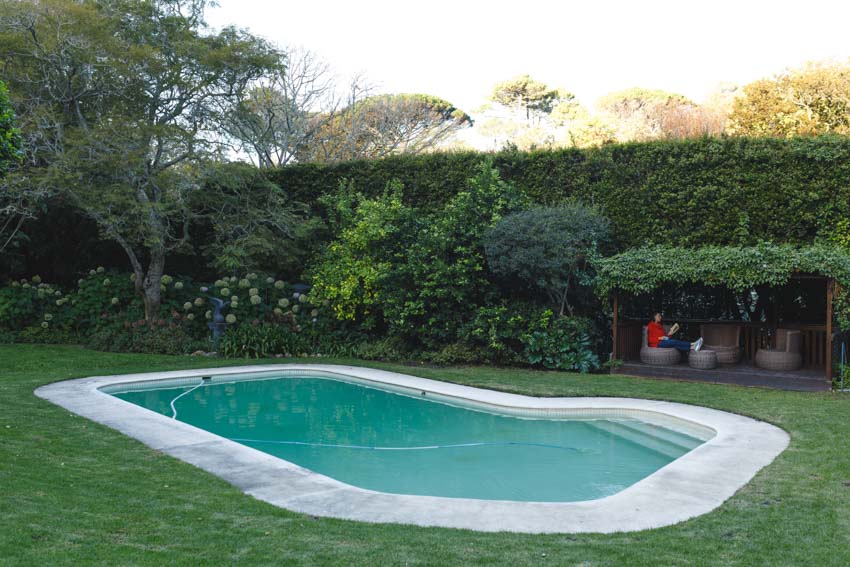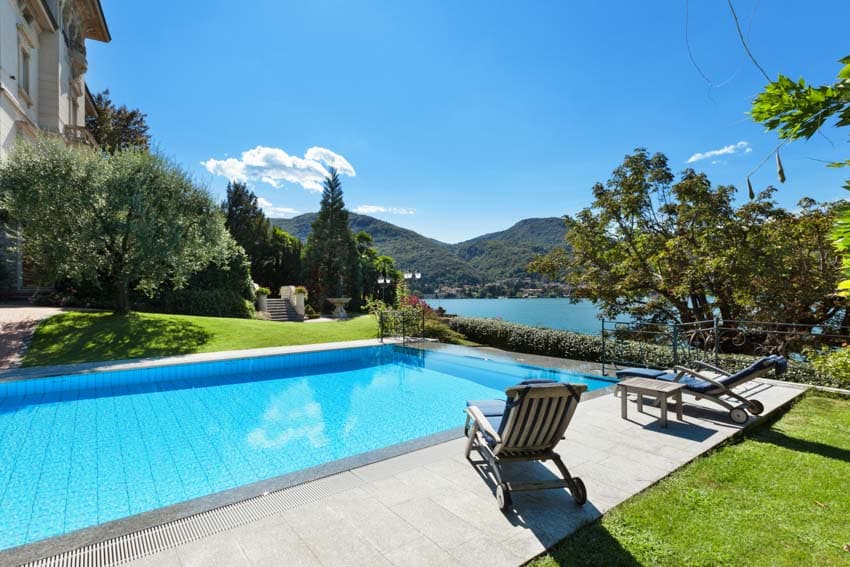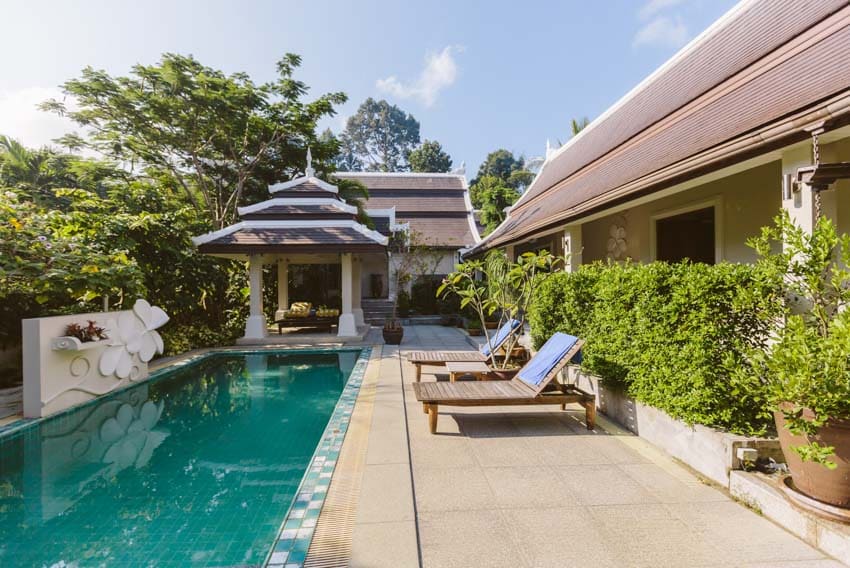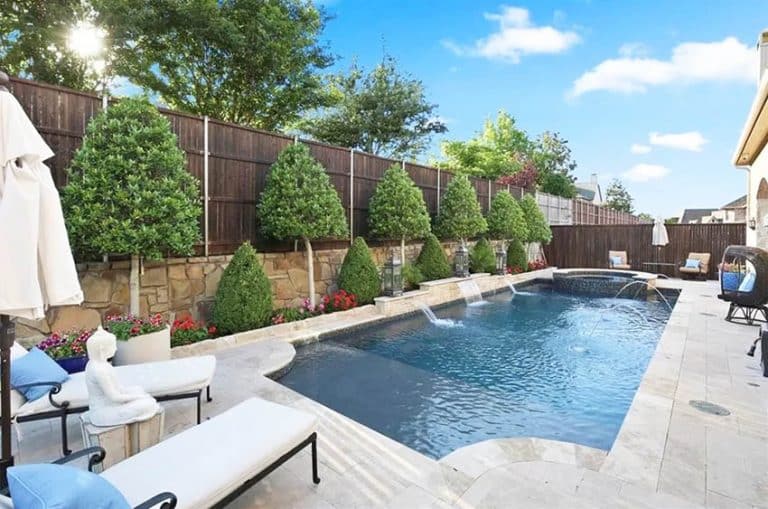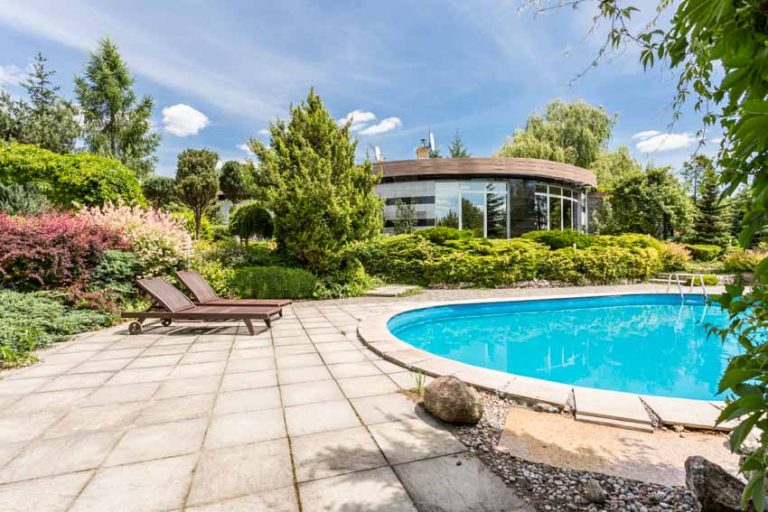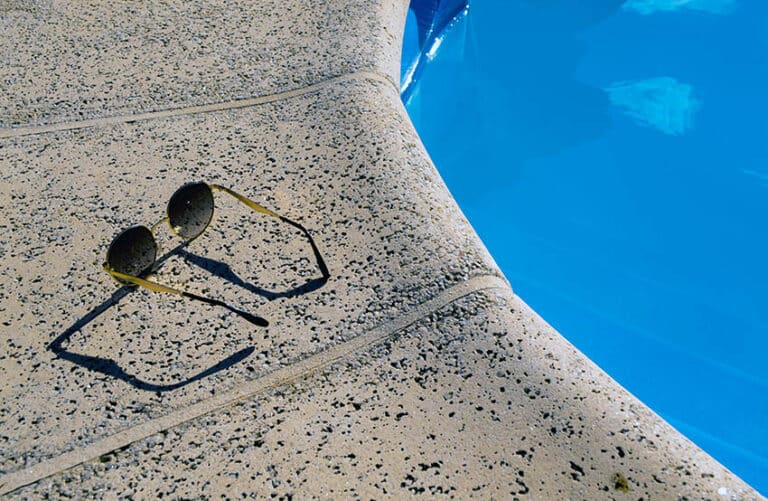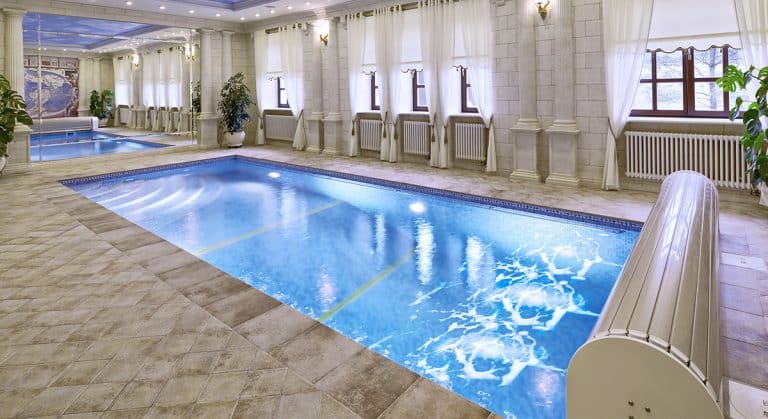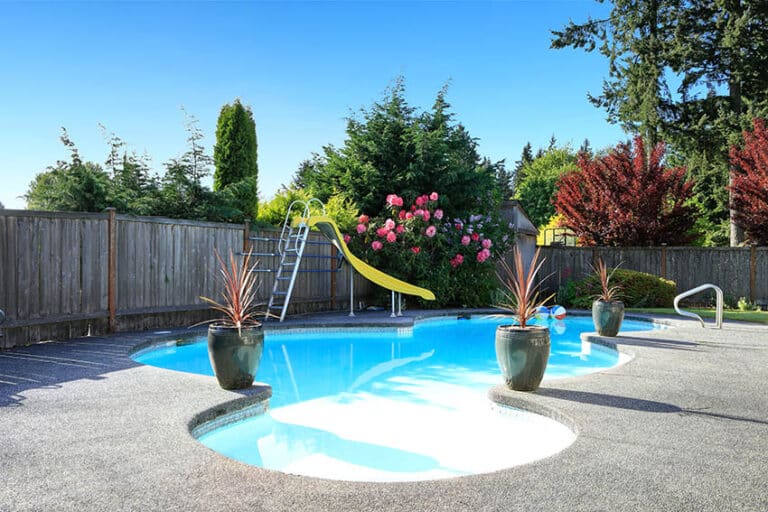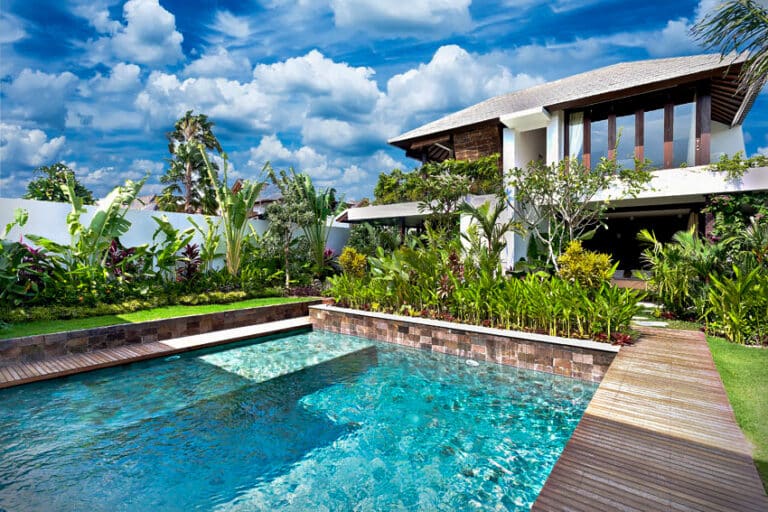Gunite Pool (Pros and Cons, Colors & Finishes)
Are you considering purchasing a new swimming pool for your backyard? Concrete, fiberglass, and vinyl liners are the three kinds of inground pools you are undoubtedly familiar with. If you have been thinking about buying a concrete pool, we are sure you have come across gunite pools.
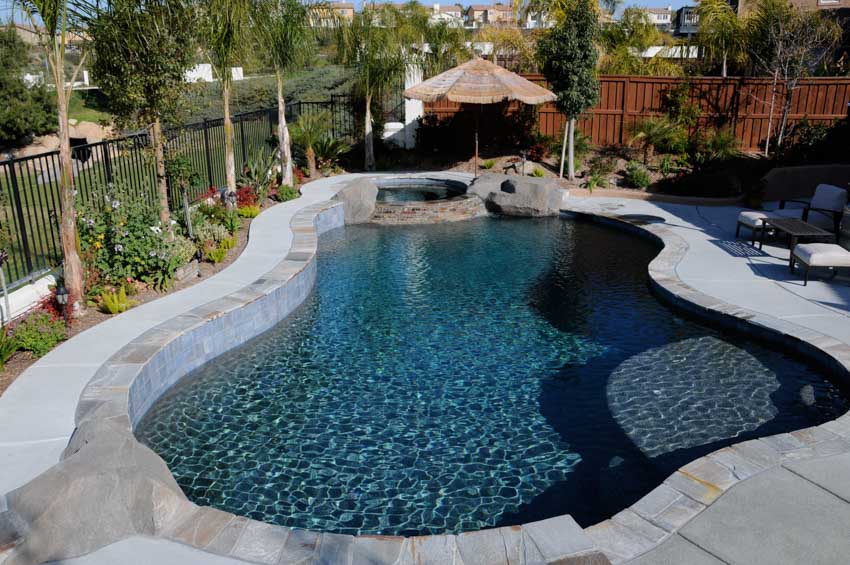
Gunite has been the standard for both commercial and residential swimming pool construction due to its design versatility and durability. This article will go over the basics of gunite pool material, how you use it in pool construction, and its advantages and disadvantages.
What Is A Gunite Pool
Gunite is a kind of concrete. To be more exact, the phrase “gunite” refers to transforming concrete from a large glob of viscous goo into a beautiful and functioning swimming pool.
Gunite is a concrete mix of sand, cement, and water poured using a high-pressure hose and is known for its consistent structural strength. It cures to a rock-hard consistency, generating a thick, solid structure.
It has had a specific role in swimming pool construction for decades, combined with another strong building material—steel—and an interior finishing layer of plaster. Gunite is very flexible to the pool form; it creates flowing lines, diverse curves, depths, and forms, all of which come together in a visually pleasing structure.
The smooth mix, made primarily of cement and marble dust, may include tinted quartz aggregate for increased durability and beauty. Plaster is the final layer that waterproofs a gunite pool, and it is this dazzling inside surface that everyone sees.
Gunite Pros
Here are the following advantages of the gunite pool:
Durable and solid foundation: The pool’s construction and surface material are both very durable. They are ideal in business settings where vandalism is a worry because of their resilience and absence of a liner.
Furthermore, gunite maintains its form for an extended time because of the steel structure. These pools are the most durable of all inground pools, and they often come with the most outstanding warranties.
Limitless design options: The swimming pool design options are practically limitless because of the gunite pool’s on-site planning and manufacturing. On the other hand, fiberglass pools are manufactured to a particular form before being transported to the site in one piece and lowered into the dug hole.
Surfaces built of concrete or plaster may have a variety of finishes, including tile, stone, and manufactured textures. You may also add pool waterfalls, custom stairs, and other water features.
Built to last: The plaster-coated shell is concrete, resilient, and porous, enabling it to store water, give stability, and extend its life. Because these pools do not need wooden supports to maintain their form, they are easier to construct than regular concrete pools. The walls can withstand a lot of tension and strain.
Versatile: This material allows you to change the pool’s geometry, which is ideal for people who desire a particularly deep or colossal design and one with bespoke tanning ledges. Furthermore, because of the steel framework employed in conjunction with this material, it may keep its resilience and form over time.
Easy to customize: With bespoke pools, you have additional options for adding different swimming pool water features. The sky’s the limit when it comes to personalizing since the process of construction is more receptive to unique pool shapes and designs.
You may make a design in any size, shape, or depth. You may go creative with built-in barstools, uneven underwater seats, tanning ledges, and more when it comes to facilities. These pools also allow you to add monolithic containers such as streams, spas, and waterfalls, which enhance the natural aspect of your landscape.
Increases the value of your house: Even though fiberglass pools are growing around the nation, many experts think that a big concrete design is still a better selling factor for homeowners.
The explanation for this might be that gunite pools were more widespread in the 1970s and 1990s, and as a result, they were in the majority of recent house purchases that included a value for swimming pools.
Greater return on investment: These pools need less care and are ideal for homeowners who want to modernize their homes. This pool lasts longer because of its durability, making it an excellent investment for your home because it lowers future costs.
Gunite Cons
Here are the following drawbacks of installing a gunite pool:
Longer installation time: Building these pools from the ground up may take 2-3 months or more. It depends on how much work is on-site and how long it takes for the concrete to cure.
Rough bottom: The rough bottom of a gunite pool is abrasive and unpleasant for many swimmers and children. If a swimmer is in for an extended amount of time, it is typical to scratch and irritate their feet, and sitting on the pool’s stairs or benches will almost surely snag a swimsuit.
Higher maintenance: What is clear is that these types of pools have substantially higher maintenance and energy expenditures. Because the pool’s surface interacts with the water and may serve as a breeding ground for algae, extra upkeep is required.
Furthermore, it is best to renew a plaster finish placed on concrete pools every 7 to 10 years. Frost may also harm concrete pools in colder areas, necessitating periodic surface repairs. Read more about different swimming pool finishes here.
Porous: Concrete is incredibly porous, making it challenging to maintain, and it also provides a haven for algae. It is necessary to employ extra chemicals and upkeep to keep algae at bay.
The alkaline pH of the pool shell elevates the pH of the water regularly, necessitating the addition of acid frequently to counteract this effect.
Gunite Swimming Pool Colors
The finishing material employed determines a pool’s final color and texture. Here are the most common gunite colors:
Standard White Pool Plaster: Plaster with white marble dust, often known as marcite, has been the most widely used finishing material for swimming pools. The traditional finish of white plaster is tried and true.
White plaster is still extensively utilized today for individuals who wish to emulate the Hollywood glamor look (especially in Greek villas). The color will darken a few shades when exposed to light.
Light Colored Plaster: A light-colored blue or gray plaster provides pools with more color depth than a white plaster finish. As you walk from the entrance to the deep end, this light blue plaster offers a gradient hue. The darker the water color becomes as the depth gets more profound, which is particularly visible with light plasters.
Blue Plaster: Depending on the shade of blue you choose, it might seem like you’re swimming in a pool of sapphire jewels. Using a midnight blue plaster is the simplest method to get this appearance. Keep in mind that colors may differ somewhat across manufacturers.
Tahoe blue is another famous blue that is less vivid and more traditional. Regardless of your decision, blue plaster looks excellent next to a light-colored deck, giving the pool a pop of color.
Green Plaster: Green-colored plasters are often in resorts, and they strive for a light aqua water hue that gives the pool a tropical feel. The water color in the shallow regions (such as the tanning ledge) contrasts sharply with the color in the deeper sections, as it does with any light-colored plaster. This aesthetic may be gorgeous with the correct deck paint and patio furniture.
Teal Colored Plaster: Teal-colored plaster has a distinct appearance that many pool owners choose for various reasons. For starters, it looks like a pool in an exotic Asian home.
Second, they are separate from one another. Third, they resemble a lagoon instead of appearing like traditional pools. Teal plaster has a deeper hue than green plaster, resulting in a darker, more uniform color across the water. See more pictures of lagoon style pools here.
Dark Gray/Black Plaster: Dark plasters draw attention to the pool and give it a high-end feel. The stone pool deck and the dark stone wall with black water feature accents look fantastic with this dark gray plaster. Dark plasters improve the water’s reflecting characteristics, simulating an actual lake.
Gunite Swimming Pool Finish
Plaster finishes are incredibly smooth and cost-effective, but they need ongoing care and water testing to avoid discoloration and premature eroding. The good news is that pool finishes are not only limited to plaster. While aggregate and tile types of finishes are more costly, they may give richer color tones and durability.
Aggregate Finishes: Pebble finishes, also known as aggregate finishes, have a pleasing natural look and texture and come in a broad range of hues. Even though aggregate materials are more costly than gunite and plaster, they are more resistant to pool chemical abrasion and have a longer product life.
While pebbles are the most used aggregate, other aggregates like quartz and marble are increasingly gaining favor. In the aggregate finish sector, even glass is making inroads.
Tile Finishes: Tile finishes are the best of the bunch. Tiles do not need replacement if adequately maintained. The disadvantage is that they are the most costly finish choice. There are three types of pool tiles: ceramic/porcelain, stone, and glass.
• Ceramic/porcelain is the least expensive of the three options. Porcelain is more durable than ceramic and is the preferred choice at this pricing point. You may see porcelain tiles in many hotels and public pools because they endure a long time, are simple to clean, and are available in many designs and mosaics.
• Stone tiles are a finish that elevates your pool’s degree of elegance. Granite, limestone, travertine, quartzite, and sandstone are popular stones. Stone is anti-slip, salt water-resistant, and will not fade due to chlorine exposure owing to its inherent qualities.
• Glass tiles, unlike stone, have a sheen to them, which means they reflect a lot of light. The water may nearly appear like bits of diamonds are sprinkled throughout the water with some darker tiles. Glass tiles offer an ultra-luxury aesthetic.
Gunite Finish Pool Cost
The complete cost of installation of a gunite swimming pool is between $55,000 and $100,000. Still, it depends on the features included. However, in today’s COVID-era market, we seldom see gunite installs for less than $100,000.
Because you can customize gunite pools to any size, shape, and depth, with almost any conceivable feature, expenses can rapidly rise into the six-figure range even if you seek to build a smaller and less unique design.
Installation
Digging your pool form and installing the iron rebar will be the first step in construction. The rebar framework forms a grid around the perimeter of your pool to support the construction. As the builder sprays a thick layer of gunite around the rebar, you’ll start to see your idea come to life. After that, the gunite is polished and allowed to set.
You will add your finish to your custom-designed backyard after being set. Plaster is the most popular finish since it comes in various colors to fit your poolscape.
If you are looking for a more high-end and distinctive design, a tiled finish may be more to your taste. Tile elements in your plaster finish may offer intrigue and a splash of color.
Adding A Hot Tub To An Existing Pool
In most places, adding a hot tub to your gunite pool costs roughly $8,500.00 and may cost up to $20,000.00, depending on design customization and size. Many new home purchasers may justify this expense, while others spend all of their money on pool-specific amenities.
Prices for connected spa combinations tend to rise when the size exceeds 7 feet (inside), increasing above the pool level. Installation of a spa during construction is far less expensive than adding one afterward.
Adding a hot tub is similar to constructing a tiny pool. Just deciding whether to include a hot tub (or not) is a vital choice; then there is the design, shape, height, spillway, seats, and where to place the pool’s deep end, among other things. As with creating a personalized design, you may begin with a cookie-cutter spa and work your way up.
Gunite Resurfacing
In many circumstances, gunite pool resurfacing may revitalize an old surface and bring it back to life. Here are several clear indicators that it’s time to resurface your gunite finish.
1. Stains: In most cases, a stain on your pool’s surface is minor damage that is more bothersome than dangerous. But, much like that stain on your favorite shirt, we know how aggravating a stain can be when it’s the first thing you notice whenever you’re swimming.
• Texture: Texture is a massive red flag if it seems rougher than it should or if the gunite is starting to show through. Unbalanced pH levels in your pool’s water may damage and ruin its surface in addition to coloring it.
• Leaks: A worn or broken surface will likely leak water. A failing surface that leaks will only become worse.
For gunite pools, there are a few potential resurfacing alternatives:
Marcite: Marcite is a standard plaster treatment for pool surfaces made of cement, water, and marble dust (or silica sand). This surface, sometimes known as white plaster, is trustworthy and offers a waterproof cover over porous gunite.
Marcite is also a popular option among homeowners due to its affordability and smooth, conventional look. This finish is especially appealing because it reflects light within the pool, creating a refreshing, vibrant blue look.
Quartz Aggregate: A quartz aggregate, which lasts longer than marcite, is made out of plaster combined with minute bits of quartz, stones, glass beads, and other materials. Many clients choose this since it is more durable and stain-resistant and provides a beautiful aesthetic via bespoke mixing possibilities.
A comprehensive checkup by a specialist is the best thing you can do for your aging structure. A professional will inspect all essential equipment for leaks, malfunctions, and proper functioning, including the pump, heater, filter, and drains.
How Much Does It Cost To Resurface Gunite
The cost of gunite and fiberglass, including labor, may reach $6,500. Resurfacing may be needed to rebuild the pool’s surface and foundation entirely, depending on what you already have.
This costs between $35,000 to $65,000, similar to constructing new pools. Paint is inexpensive and comes in a variety of colors. For those with prior expertise, this may be a do-it-yourself project.
Gunite Maintenance
Gunite pools may be expensive to maintain in the long run. Over ten years, we have seen gunite and shotcrete pools cost over $2,700 per year. This 10-year maintenance cost of $27,000 includes more chemicals and energy than comparable-sized fiberglass or vinyl liner pools.
It also covers the costly but necessary expenditures of replastering and acid cleaning. You’ll need to use extra chemicals and filtration and brush the sides more often to eliminate algae.
Gunite and shotcrete pools, unlike fiberglass or vinyl types of liner pools, will ultimately exhibit indications of wear. You will need to refinish your pool’s surface to keep the smooth and appealing look, which involves applying a new coat. On the other hand, unlike vinyl or fiberglass rivals, your gunite material will never lose its form.
Remember that routine care will keep your pool in great shape, whether you have concrete, fiberglass, or gunite. But definitely, gunite pools are very fantastic because of their exceptional durability and aesthetic appeal.
See more related content in our article about the different swimming pool sizes on this page.

